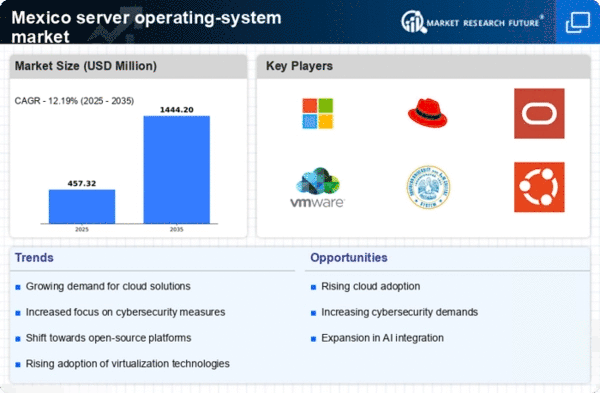Emergence of Edge Computing
The emergence of edge computing is reshaping the server operating-system market in Mexico, as organizations seek to process data closer to the source. This trend is particularly relevant for industries such as manufacturing, healthcare, and retail, where real-time data processing is crucial. As businesses increasingly deploy edge devices, there is a growing need for server operating systems that can efficiently manage these distributed environments. Recent data suggests that around 40% of Mexican companies are exploring edge computing solutions, which drives demand for operating systems optimized for low-latency processing and resource management. Consequently, vendors are focusing on developing lightweight server operating systems that can operate effectively in edge environments, thereby catering to the specific needs of businesses looking to harness the power of edge computing.
Increased Focus on Data Security
In the context of the server operating-system market, the heightened emphasis on data security is a critical driver in Mexico. With the growing number of cyber threats and data breaches, organizations are prioritizing the implementation of robust security measures within their server environments. Recent statistics indicate that over 70% of Mexican companies consider data security a top priority when selecting a server operating system. This trend compels vendors to enhance their offerings with advanced security features, such as encryption, access controls, and intrusion detection systems. As regulatory compliance becomes increasingly stringent, businesses are also seeking server operating systems that facilitate adherence to data protection laws. The focus on security not only influences purchasing decisions but also shapes the development of new features and functionalities within the server operating-system market.
Rising Demand for Virtualization
the server operating-system market in Mexico experienced a notable increase in demand for virtualization technologies.. As businesses seek to optimize their IT infrastructure, virtualization allows for the efficient use of hardware resources, reducing costs and enhancing scalability. According to recent data, approximately 60% of organizations in Mexico have adopted virtualization solutions, which directly influences the server operating-system market. This trend is driven by the need for improved resource management and the ability to run multiple operating systems on a single physical server. Consequently, vendors are focusing on developing server operating systems that support advanced virtualization features, thereby catering to the evolving needs of enterprises. The rising demand for cloud services further propels this trend, as organizations look to leverage virtualization for cloud-based applications and services.
Growing Adoption of Containerization
The server operating-system market in Mexico is experiencing a surge in the adoption of containerization technologies. This trend is driven by the need for greater efficiency and portability in application deployment. Containerization allows developers to package applications and their dependencies into isolated environments, facilitating faster deployment and scalability. Recent surveys indicate that approximately 50% of Mexican organizations are currently utilizing containerization solutions, which directly impacts the server operating-system market. As a result, vendors are increasingly focusing on developing server operating systems that support container orchestration platforms, such as Kubernetes. This shift not only enhances operational efficiency but also enables businesses to innovate more rapidly. The growing adoption of containerization is likely to continue shaping the server operating-system market, as organizations seek to leverage its benefits for modern application development.
Shift Towards Hybrid IT Environments
the server operating-system market in Mexico is shifting significantly towards hybrid IT environments., where organizations combine on-premises infrastructure with cloud services. This trend is driven by the need for flexibility and scalability, allowing businesses to adapt to changing demands. Approximately 55% of Mexican enterprises are currently utilizing hybrid IT solutions, which necessitates server operating systems that can seamlessly integrate with both local and cloud-based resources. As a result, vendors are increasingly developing operating systems that support hybrid architectures, enabling organizations to manage workloads across diverse environments. This shift not only enhances operational efficiency but also provides businesses with the agility to respond to market changes. The growing adoption of hybrid IT is likely to continue influencing the server operating-system market, as companies seek to leverage the benefits of both on-premises and cloud solutions.
















